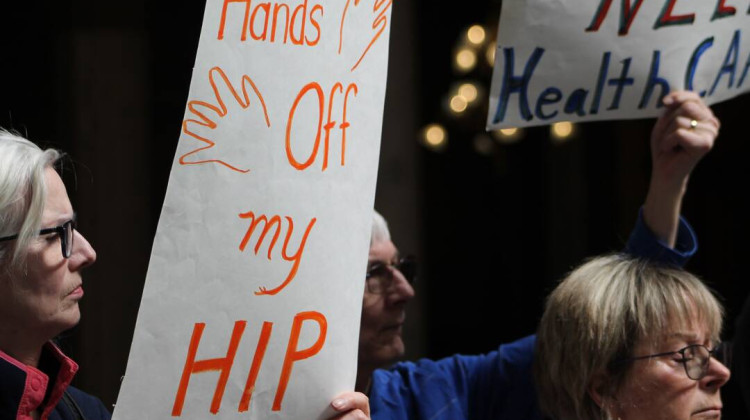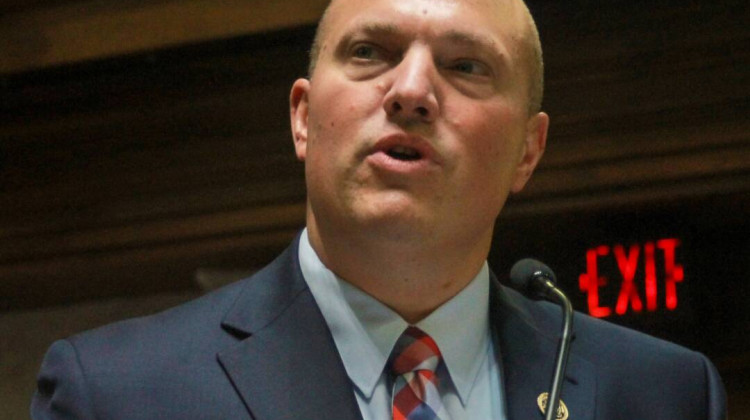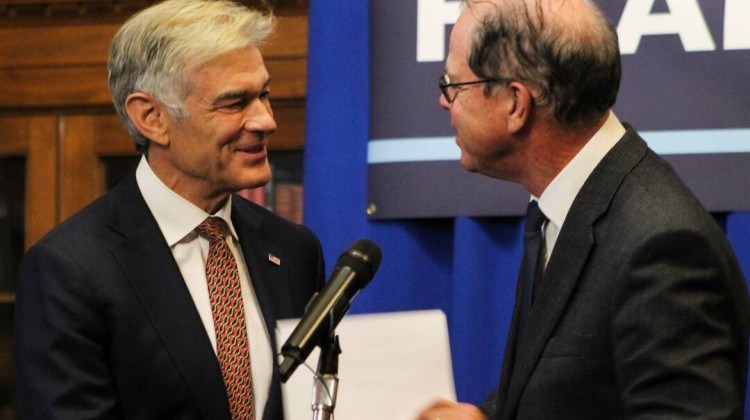
The state announced a total of more than 111,000 total confirmed cases – including two days with more than 1,000 reported cases – and more than 1.3 million Hoosiers tested.
Lauren Chapman/IPB NewsThe Indiana State Department of Health reported 67 additional confirmed deaths over the last week, bringing the state’s total to 3,281. The state announced more than 111,000 total confirmed cases – including two days with more than 1,000 reported cases – and more than 1.3 million Hoosiers tested.
Here are your statewide COVID-19 headlines from last week.
Attorney General Candidates On AG Curtis Hill's Latest Vote-By-Mail Position
Indiana Attorney General Curtis Hill would rather a court eliminate the current vote-by-mail option for Hoosiers aged 65 or older than allow every eligible voter to cast a mail-in ballot.
That’s from an ongoing lawsuit aimed at expanding vote-by-mail for the fall election.

Democratic AG candidate Jonathan Weinzapfel calls Hill’s position “short-sighted, purely political and dangerous.”
Republican candidate Todd Rokita said he hasn’t read Hill’s brief. But he doesn’t want to see any changes to Indiana’s election system this close to Election Day.
“We don’t have the infrastructure, we don’t have the facilities, we don’t have the person power to conduct a mail election accurately, without fraud,” Rokita said.
U.S. Sen. Mike Braun Won't Support Help For Indiana State Budget
U.S. Sen. Mike Braun (R-Ind.) says he’ll be “disappointed” if the federal government provides any financial support for state and local government budgets in future COVID-19 relief packages.
State budget officials project Indiana will have a $1 billion hole in its budget by the end of the current fiscal year, even with the state’s significant financial reserves. They’ve repeatedly asked for federal help, including by loosening restrictions on existing federal CARES Act funding.
Braun was asked directly why he doesn’t support the kind of help Gov. Eric Holcomb and state officials have requested.
“We will make it through it based upon how we’ve lived our life in a responsible way, as a state government,” Braun said.
The governor has already cut higher education funding and asked state agencies to slash their budgets by 15 percent.
State Paralyzed Over Conflicting COVID-19 Relief Funding Guidance
A senior Indiana budget official says the state is somewhat paralyzed by conflicting directives from the federal government over how it can spend COVID-19 relief dollars.
The Trump administration continually sends guidance to the states over how they can spend federal CARES Act funding. But that can often confuse more than it helps. State Office of Management and Budget Director Cris Johnston said, for example, the U.S. Treasury sent updated guidance at the end of August. The Treasury’s Inspector General also sent guidance a few days later that didn’t match.
“Fear of the inspector general that comes out to your state and says ‘give me all your documentation as to why you made this decision’ has sort of put a little paralysis out there in people’s minds,” Johnston said.
The state has committed to spend just $1.1 billion of the $2.4 billion it’s received in CARES Act funding. And it’s actually spent less than 10 percent of the total.
DWD Puts In Request For Federal Unemployment Loan
The Department of Workforce Development requested to borrow $300 million from the federal government to pay state unemployment insurance claims. Those receiving unemployment benefits will be paid as usual, but it could mean higher payroll taxes for businesses in the future.
Before the pandemic, the state had saved up about $900 million from employee payroll taxes. As of Thursday, that fund was depleted to under $100 million.
The federal Department of Labor said that despite signaling a need for an advance, Indiana has yet to withdraw federal funds. They add that even when states request authorization for an advance, sometimes they don’t actually use it.
Indianapolis VA Hospital Failed To Keep Workers Safe From COVID-19, Says OSHA
A veteran’s hospital in Indianapolis received federal violations for failing to protect its employees from COVID-19. It’s one of the few workplaces in the country to receive a virus-related citation from workplace safety inspectors.
The Occupational Safety and Health Administration says the Richard L. Roudebush VA Medical Center failed to provide PPE to some workers including entrance screeners, cardiology workers and paperwork processors in mid-March.
The violations correlate with three deaths from the coronavirus, according to the union that represents VA workers. Internal memos show the Veterans Health Administration didn’t require all employees – not just those interacting with COVID-19 patients – to wear masks until May 7.
A spokesperson for the hospital called the OSHA reviews “misleading” because they attempt to judge actions that are six months old, even though the facility has provided care for 500 COVID-19 patients. They said the current employee infection rate is zero and the hospital always followed CDC guidelines around COVID-19 testing, treatment and prevention.
State Health Commissioner: Halloween Can Be Safe With Precautions
Indiana’s state health commissioner said she believes there is a safe way that Hoosiers can enjoy Halloween this fall amid the ongoing COVID-19 pandemic.
Decisions on whether to allow trick-or-treating this year are handled by local officials. And Dr. Kris Box said if the COVID-19 data in the community is at good levels, there’s no reason to cancel Halloween – while still recognizing that some precautions are important.
“It’s about washing your hands carefully, right?" Box said. "It’s about not letting your kids dig into that pumpkin, in that bucket, and eat it as they’re walking around unless their hands have been washed.”
Researchers Say Without Government Stimulus, Poverty Is Back On The Rise
Researchers say extra money from the U.S. government helped many people rise out of poverty, even during the economic crisis caused by the pandemic. But now much of that stimulus is gone and poverty is rising again.
Economists at three universities, including Notre Dame, closely follow federal data on household income each month and update their findings online. They also published a paper with the National Bureau of Economic Research last month outlining their methods.
They say the national poverty rate fell a little more than 1 percent between April and June thanks to stimulus checks and an extra $600 unemployment benefit. The positive effects were most prominent for workers who identified as neither White nor Black and those with no college education.
Indiana Needs Food Bank Volunteers As National Guard Deployment Ends
Indiana’s food banks are in critical need of volunteers. The state is putting out a call for help ahead of the end of the month – when the need increases significantly.
The Indiana National Guard deployed members to the state’s 13 regional charitable food distribution sites around the beginning of the COVID-19 pandemic. But their temporary, six-month deployment ends Sept. 30, leaving food banks with a huge gap in their workforce needs. And the increased demand for food hasn’t waned as the pandemic continues.
Hoosiers interested in volunteering can sign up at OperationFood.IN.gov. They’ll be matched with the food bank in their area to coordinate assignments.
Eli Lilly Trials See Fewer COVID-19 Hospitalizations With Antibody Drug
Indianapolis-based Eli Lilly announced Wednesday its COVID-19 antibody drug is showing results in reducing hospitalizations from the virus. This is the company’s first data to be reported on mild to moderate cases but still needs to be reviewed by peers.
The data comes from the trial’s Phase 2 patients who had recently tested positive for COVID-19 before participating in the study.
The group saw 72 percent fewer trips to the ER or hospitalizations from people who received the antibody treatment compared to those who received the placebo.
An antibody treatment only protects and treats a patient for a short period of time, approximately a couple of weeks to a month, unlike the vaccines being developed.
More Than $61 Million Going To Indiana Schools For Teacher Training, Remote Learning
More than $61 million in federal funding from the CARES Act is making its way into Indiana schools to support remote learning needs.
The money is coming to K-12 schools, as well as colleges and universities, as grant awards made through the Governor's Emergency Education Relief (GEER) fund. It aims to help the state ramp up access to remote learning technology and build up training for current and future educators.
Join the conversation and sign up for the Indiana 2020 Two-Way. Text "elections" to 73224. Your comments and questions in response to our weekly text help us find the answers you need on COVID-19 and the 2020 election.
A team from Indiana University's School of Education at IUPUI is creating a digital remote learning hub using the funding.
In addition to the digital learning hub, teams at IU also plan to create a virtual educator license pilot program, and use grant funding to pay tuition for teachers to pursue certificates in online teaching at IU East.
More than 140 school corporations and universities in Indiana received funding through the grant, including Purdue University and the University of Indianapolis.
Many grant recipients are partnering with several other schools and school corporations to offer additional support.
Study Emphasizes COVID-19 Effects Worsened by Obesity Rates
Indiana is one of 12 states with an obesity rate of at least 35 percent among adults, according to a new national report. COVID-19 and high obesity rates could aggravate health issues for an already at-risk population
Trust for America’s Health specifically focused on the effects of obesity in relation to COVID-19 for this year’s report, as the combination of the two could aggravate health issues for an already at-risk population.
President and CEO of Trust for America’s Health John Auerbach said it takes more than just willpower to get to a healthy weight, but a healthy weight could prove life-saving during the pandemic.
“It’s not just chronic diseases,” he said. “It also increases your risk of serious illness or death from an infectious disease like COVID.”
Holcomb Offered State Support To Big Ten Universities Ahead Of Football Resumption
Gov. Eric Holcomb said he talked with the presidents of Purdue and Indiana University ahead of the decision to resume Big Ten football this fall.
The athletic conference announced Wednesday it plans to allow its 14 football teams to begin play in late October.
Holcomb said he offered IU President Michael McRobbie and Purdue President Mitch Daniels the state government’s support in whatever decision they made.
Indiana Chief Justice Loretta Rush Tests Positive For COVID-19
Indiana Supreme Court Chief Justice Loretta Rush has tested positive for COVID-19, her office announced Monday.
Rush is the highest-ranking state official who’s publicly announced a positive COVID-19 test.
Rush’s office said she took a test after a family member was positive and was already self-isolating before her own result came in.
The chief justice was previously working remotely and hasn’t been to the Statehouse since Sept. 1.
Contact Lauren at lchapman@wfyi.org or follow her on Twitter at @laurenechapman_.
 DONATE
DONATE






 Support WFYI. We can't do it without you.
Support WFYI. We can't do it without you.